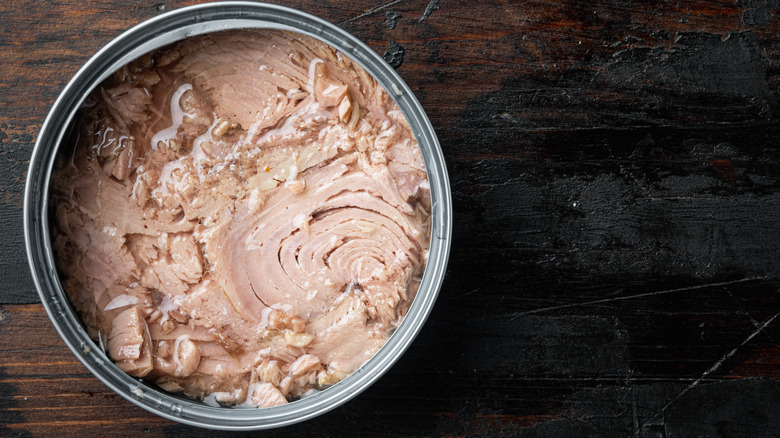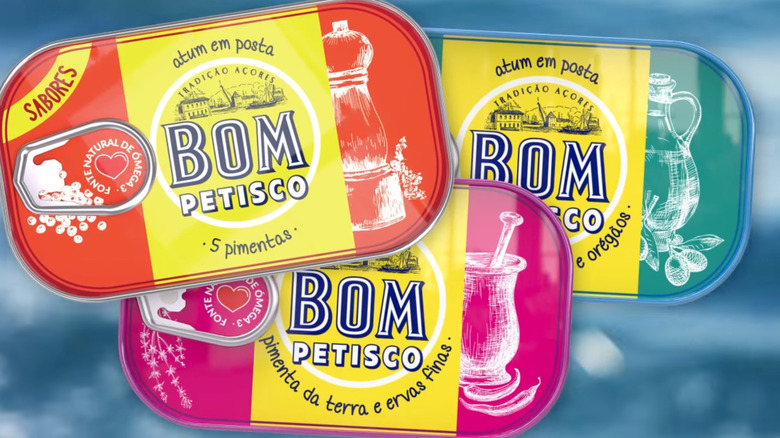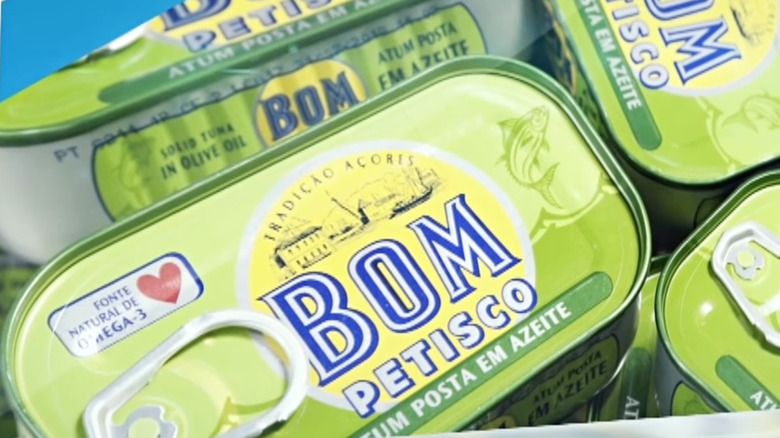Bom Petisco: The High-Quality Portuguese Canned Tuna You Should Try
What do you think of when you see a can of tuna? Tuna melts, tuna noodle casseroles, tuna salad? This solid Americana fare begins and ends with a tin of tuna, an economical and sometimes tasty meal. In America, most tuna dishes require numerous flavorful add-ins, helping to make up for an occasionally dry and — let's face it — bland can of fish. This is not the case in Spain and Portugal.
On the Iberian peninsula, tinned seafood, including the humble can of tuna, is elevated to gourmet excellence. Also known as conservas, canned fish reflects a simple yet high-quality approach to food, where fish is sustainably sourced and elegantly preserved within fine oils, sauces, and herbs. Simply put, the Spanish and Portuguese take their tinned seafood seriously.
With this in mind, foodies are taking note of Portuguese and Spanish brands of conservas, like Portugal's top tuna brand Bom Petisco — a company with a renowned product and illustrious history. So what's the story behind this particular can of tuna?
Bom Petisco, Portugal's preferred can of tuna
The Portuguese canning industry began in 1853, with the founding of the Ramirez canning company in Vila Real de Santo António. Then, as methods of pasteurization were embraced by manufacturers, Portuguese canning companies began canning the king of all fish: tuna. By the 1950s, the cannery business took a hit, as overfishing caused tuna to change their migration patterns.
Enter Bom Petisco. In 1962, they built their canning plant on São Miguel island in the Azores, the Portuguese island chain located in the Atlantic Ocean. The warm waters around these volcanic islands are favored by schools of Skipjack tuna, the tuna of choice for Bom Petisco. This prime tuna was boiled in seawater before being preserved in oil, olive oil, or brine, offering unadorned but quality canned tuna. Their tuna continues to be a consumer favorite because Bom Petisco still follows this simple recipe.
Conservas didn't always enjoy a good reputation in Portugal. In a place rife with fresh seafood, canned fish used to be considered a "poor man's food." Over time, Bom Petisco has become one of the most popular brands of canned tuna in Portugal and can be enjoyed for its gourmet reputation.
Make a top-tier tuna salad
Made from some of the best tuna in the world and canned with zero preservatives, Bom Petisco has begun catching the eye of some of America's top chefs.
One such chef who has been singing their praises is Amy Brandwein, the chef and owner of two hit Italian restaurants, Centrolina and Piccolina, in Washington, D.C. How does she like to use this high-quality tuna? Simply, as the protein-packed star of a panzanella, with a medley of avocado, hot pepper, lemon, and olive oil thrown in for good measure. Brandwein also suggests you give Bom Petisco's canned sardines a try as well, claiming they'll even work as a good substitute for fresh sardines in a pinch.
If you'd like to use Bom Petisco tuna the Portuguese way, you should make Portuguese tuna salad, a blend of tuna, chickpeas, potatoes, olives, and hard-boiled eggs marinated in lemon juice and/or vinegar. This is peak bar food in both Portugal and Spain, a refreshing seafood tapas to enjoy with a drink.
If you're looking to get your hands on this tasty canned tuna, your best bet is to shop online. Though Bom Petisco can be found online at gourmet Portuguese websites, it can also be purchased on more humble platforms like Amazon. Otherwise, you could always try your luck at gourmet markets, like Brandwein's at Centrolina. Either way, it's worth the trouble to track it down — you'll be rewarded with the ultimate canned tuna.


